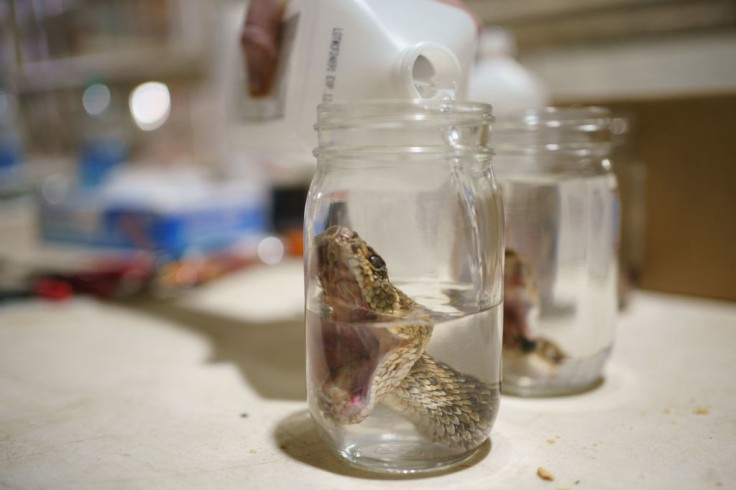
A snake expert has advised parents not to waste their time and immediately bring their children to the hospital in case of rattlesnake bites following an incident with a California toddler at her house near the Butte Creek Canyon.
Three-year-old Alice Germar joined her dad when he took the trash to their driveway one evening when a rattlesnake bit her barefoot. Mom, Tia Germar, said that they usually encounter rattlesnakes in their neighborhood, but this was the first time one of their family members was bitten.
Tyler Young told Action Now News that rattlesnakes generally do not attack and bite unless they feel scared or trapped. If parents find themselves or their kids in such a situation, they should not attempt to put ice on the bite wound or suck out the venom. The expert said that the best thing to do is call 911 for medical attention and watch out for the victim's breathing while waiting for help to arrive.
Read Also: Police Warns of Long Island Girl Scout Cookie Scam Involving Adorable Girl and Her Father
Ideally, a person bitten by a rattlesnake needs to get treatment within the hour. The victim must also avoid moving about to regulate or lower their heart rate.
In the case of Alice, Dr. Nicklaus Brandehoff at the Enloe Medical Center said that they were able to administer an antivenin injection at the appropriate time, which helped reduce the swelling. However, as a precaution, they moved Alice to UC Davis for further medical evaluation. Tia said that Alice is expected to recover and has had four popsicles since arriving at the center's pediatric unit.
Fatal snake bites seldom happen
The San Franciso Gate reported that five people die on average among 7,000 to 8,000 snake bites in the U.S. annually. Snake bite season takes place from April to October, when families enjoy outdoor activities.
Brandehoff also stated that rattlesnakes do not produce high amounts of venom despite the myth from TV or movies. A baby rattlesnake's venom is just "two tic tacs worth," while an adult rattlesnake's venom is about two M & Ms.
A snake only bites when he/she sees you as a threat. In self defense they retaliate. Although they make first warning of hissing 🐍 to warn you “keep a way ⛔️” The day you stand still, a snake will by pass without doing any harm.
— THE VETERINARY DOCTOR (@DrAsumanYusufu) June 18, 2022
But while fatal snake bites rarely happen, it's still best to observe safety precautions while waiting to get medical attention. For instance, it will help to clean the bite spot with soap and water. The experts also advise removing any jewelry or tight-fitting clothes to lessen constriction in the body.
Remembering the snake's appearance is vital as this information will help doctors administer the right anti-venom. The experts do not recommend going out barefoot or in sandals, especially in communities known to have snakes.
Long recovery for boy bitten by a water moccasin
Meanwhile, as Alice's prognosis has given her parents many reasons to be thankful, another family in Clay County, Florida, is bracing for more therapy for their son. Elijah Bustamante, 7, was bitten by a water moccasin while playing in their backyard.
Sanita Bustamante told First Coast News that her son was administered seven bags of anti-venom. For four days, Elijah had to be on a feeding tube because the swelling on his body made it impossible to move.
Doctors told the Bustamante family that Elijah would need physical therapy so he could regain control of his ability to walk. Sanita said she was going to quit her two jobs so she could focus on Elijah's recovery. She also warned other parents to be on the lookout for snakes in their surroundings this summer season.
Related Article: Toddler Mauled by Pack of Puppies Recovering Well But Faces More Surgeries; Family Warns of Littermate Syndrome